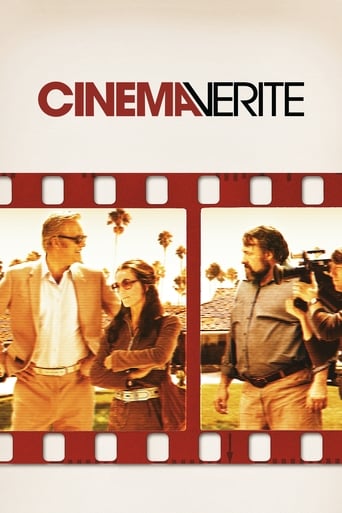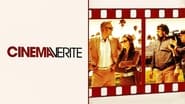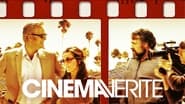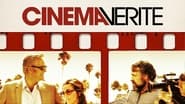MisterWhiplash
I wasn't born when the Louds became a major deal in the American public consciousness, as the first sort of "reality" family, but that doesn't matter as I should still be able to take this story on its own terms (for example, what if hypothetically it was all made up, how would it work as a story unto itself). Of course the filmmakers are adept at taking real life and spinning it into docudrama - their breakout sensation was an adaptation of the real life guy who made the comic book American Splendor, Harvey Pekar, which included interviews with the real life subjects - so one would expect this to have some authenticity as it's all about the realm of what is real-real and camera-real. One wonders what the Maysles thought of this filmmaker Gilbert.As it stands this man, played here by the late James Gandolfini (in the kind of performance that makes me miss him all the more, it's largely subtle work until the third act), is not exactly Maysles. I don't know how close they got to their subjects like the Beales (this made me think back to Grey Gardens quite a bit, also a "reality" movie in its way), but with the Louds it was the "All-American Family", and the ideal for Gilbert in the early 70's was to document it in an anthropological sense: what if aliens come down, after all, in a thousand years and want to see what we were like? It's easy to piece that together in drama, but then once you get the philosophies of Marshall MacLuhan into the mix, which this seems to also be alluding to throughout in a subtextual way, being 'natural' is difficult... at first.This story of filmmakers following this family - which includes Tim Robbins and Diane Lane as the seemingly happy married couple of a bunch of interesting, happy kids (including one who is gay but quite happy to be in the scenes of Andy Warhol and the Chelsea Hotel and the like) - is certainly gripping for most of its run-time, and gains traction as the drama unfolds for the family. There's infidelity, there's marital strife, and there's Gilbert (usually in the background) with his cameraman and sound recordist in the house getting it all. Sometimes the family doesn't notice they're there. Then they do, and the looks to the camera give it away (maybe my favorite moment is when Robbins, as he's playing the patriarch in an exceedingly tragic and sad moment, gets a foolish grin on his face as he notices the camera as he's getting in his car - it's perfect, it's just how we all would be in that situation, to hide away the pain).All of the actors can't be faulted in the slightest, and along with Gandolfini and Robbins it's hard to note point out Lane giving one of her best performances in recent memory. But there are times when things seem a little rushed... actually, a lot rushed in the final ten minutes or so, when the series finally airs on PBS and the family has to deal with the fallout. I wish we could see more of this, but the whole movie is only 90 minutes, and after giving us sort of a condensed 'greatest hits' of what this family and the filmmakers went through over several months (almost 80 days to be exact, however over much time I don't know), there seems like it's missing things. I wish there was more there there, and that may be a thing of 'no good movie is long enough' but it's more than that - by the time Cinema Verite wraps up what it has to say, and it's here that the Springer and Pulcini combine the dramatized with the actual of the family on Dick Cavette, it feels a little too little too late.What if it had been more like 'Splendor', with combining the dramatized with the actual footage? Maybe HBO only gave them so much time, but it feels off in that way. But what is here is still mostly substantial for drama and pathos, and they even get us to feel for a character as lousy (at least from what we can see) as Mr. Loude, in part due to Robbins but also just solid writing. On the whole a little simplistically drawn, and at the same time in the small moments it carries a lot of worth. And to think how far we've come... or fallen, I should say, with what people will let themselves be seen as in "reality" television.
rightwingisevil
this film is shockingly monotonous and tasteless to the bone. reality TV shows are the worst idea ever came up on the monitor since TV was invented. who would be so interested in seeing other family's 24/7 activities? we have to take 'travel' for instance, sightseeing means that you'd better look every thing from afar; because only distance would give more room and space for your imagination, a general impression from afar, looking around but not focusing would not affect your mind with burden; because once if you look every thing so close, like seeing things so close through a magnifier, a microscope, nothing would be the same as you look from afar. it is distance that would generate more nicer scenes. looking from afar of a cityscape would always better, because you won't see garbage littered around in the city streets, homeless people pan handling.why you need shutters, shades, drapes, front door, fences for your home and separate it from others? because you don't want other people to know that even your life is no different from theirs, you still need certain privacy; because even in your own home, going to the bathroom, taking a shower, you still want to close the door before taking off your clothes, you still want to use shower curtain when you take shower, not just to prevent water from splashing on the floor, it's because you also need certain degree of privacy.this film only show the shallowness of the American public. by allowing cameras into your home, your house, to disarm your basic privacy is just too stupid to be acknowledged. if you hate CCTV on every corner of your neighborhood, if you hate government to wiretap your phone calls, check your emails, why you would allow 'big brother' move into your home? i could never understand why media manipulates people to sacrifice and give up their fundamental right so easily.Diane Lane is one of the most talented actors that i always love and respect, but i really don't like to see that she always habitually raising her eyebrows, wrinkled the skin on her forehead with so many deep monkey lines whenever she spoke. when she was younger, it's tolerable, but the unavoidable aging process has made the wrinkles over her eyebrows so deep and so ugly. this was also one of the reasons that i couldn't hang on to watch this film longer, i just couldn't stand it.
Tony Heck
"One must never let the public behind the scenes for they are easily disillusioned and then they are angry with you, for it is the illusion they love." The first successful reality show was on PBS and it was about the Loud family. The show followed around Pat (Lane) and Bill (Robbins) Loud and their family. It was the first of it's kind and this movie about how it started, what it was like while it was going on and the aftermath. I was actually pretty excited about watching this because of the cast. I have to say I was not disappointed at all. The acting was great in this and the movie itself was very entertaining. I have never been a fan of reality TV but it was very interesting to see how the genre began and the immediate impact that the show had. I do have to say though that as great as this movie is and how interesting it was to see the family problems come to the surface I still have no interest to watch the real "American Family" show. That in no way means that I did not enjoy watching the Loud family in this movie though. Overall, an excellent movie that should be watched. Very, very interesting and makes me wonder how accurate it is. I give it an A-.
gradyharp
CINEMA VERITE tries very hard to justify the trend it began in the 1970s by having a camera crew move into the household and private life of the well-to-do Loud family in Santa Barbara. The idea of a docudrama about a docudrama is acceptable as a flag for the obsession with Reality TV shows spawned by this experiment. Unfortunately the writing (by David Seltzer - apparently based on the book written by Pat Loud 'A Woman's Story' about the experience) is spotty and the recreation of (1971 when the 'series' was filmed and 1973 when it hit the television screens) reminds us how boring that time frame was. The direction by Shari Springer Berman and Robert Pulcini imitates the dreary 'spontaneity' of live action drama the film addresses. It plods, tripping on the cables for the cameras placed inside the home of this sad story. Documentary producer Craig Gilbert (James Gandolfini) devises a concept for PBS he calls 'An American Family' and searches for a family that does not depict the happy-wappy family of staged productions but instead inters the privacy of an American family, examining all the aspects of that institution. He selects the Loud family, particularly because he sees Pat Loud (Diane Lane) as an early women's rights activist able to say truths others might avoid. Gilbert paces his documentary to unveil the dirt that hides behind the scenes - motivated to prod Pat to discover Bill (Tim Robbins) her husband's infidelity, which led her to seek a divorce. The Louds have two sons involved in the dream of becoming a rock band, a daughter in the throes of discovering teenage love, and a gay son Lance (Thomas Dekker) who has moved to New York to live a raucous life without the approval of his father but one visited by Pat without complete acceptance. The film crew consists of a married couple - Alan Raymond (Patrick Fugit) and Susan Raymond (Shanna Collins) - who reluctantly agree to film even the most embarrassing scenes of the film. The gradual crumbling of the Loud marriage - not helped by either Gilbert or by Pat's 'friend' Val (Lolita Davidovich) who is actually another one of Bill's affairs - is what producer Gilbert wants to record, and he succeeds. The Louds end their marriage, Lance later dies of AIDS, and the other children have minor successes in their lives. But the overriding feeling of this film is showing how the inquisitive media can be destructive in attempting to share reality with the world at large. And so began the glut of reality shows that yearly grow more irreverent in respecting privacy. Diane Lane brings moments of brilliance to her role as the manipulated Pat and James Gandolfini is given the opportunity to push his acting chops. The problem is that we all know the quasi-tragic story on which this film is based, and making us witness it again is less than entertaining. It is disturbing. Grady Harp






